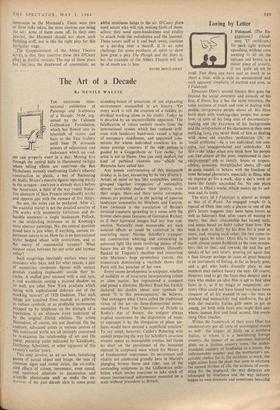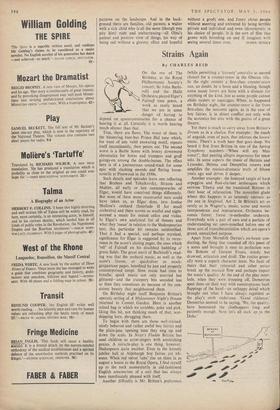Loving by Letter
I Fidanzati. (The En-
gagement.) (Acad-
Ermanno Olmi's second feature film goes far beyond the social comment and comedy of his first, 11 Posto, but it has the same reticence, the same sureness of touch and tone in dealing with people, inexpressive people above all. His films have dealt with working-class people but some- how, in spite of his long stint of documentary- making and the exactness of his backgrounds and the involvement of his characters in their own working lt‘es, you never think of him as dealing with those old standbys 'proletarian life' or 'social problerns'—he is too individual, too con- crete, too unpigeonholed and unholeable. All this is the odder when you think how his people are, like-almost all the poor, imprisoned in their environme9t-Hols or family, hopes or respon- sibility, economic straightjacket above all—and so quite unable to behave with the freedom of most fictional characters, especially in films, who on impulse go for a,walk, skip a day's work or leave the family uncooked for. No one plays truant in Olmi's world, which makes up its sad- ness and its truth.
The story of / Fidanzati is almost as simple as that of 11 Posto. An engaged couple (it is typical of Olmi that only a phrase in one of the girl's letters suggests they have been lovers as well as fidanzati) find, after years of waiting to marry, that their relationship has turned stale, and seems based on habit rather than love. The man is sent to Sicily by his firm for a year or more, and, missing each other, the two come to- gether again by letter. Olmi fills in their past in rapid, almost casual flashback as the man remem- bers this or that, and towards the end the girl speaks of her own letters, proving yet again that a face (except perhaps in cases of great beauty) is an instrument of feeling, as far as beauty goes, and ' a girl who looks dismally plain at one moment may radiate beauty the next. Of course, directors tend to get the faces they deserve and a man who makes an idiot film is apt to find idiot faces in it, as if by magic or magnetism; cer- tainly Olmi could not have found two faces more eloquent of all his wanted to say—the man so pinched and melancholy and uneffusive, the girl with the maturity Italian, girls seem to get so young, yet both with faces you might find any- where, human first and local second, like every- thing Olmi touches.
Within the framework of their story Olmi has unobtrusively put all sorts of sociological stories as well: the impact of Sicily on a northern Italian, to whom it is a bewildering foreign country, the impact of an enormous industrial plant on a Sicilian country town, the under- standable cupidity of landladies in a boom, the unforeseeable weather and the northerner's un- suitable clothes for it, the accidents at work, the night noises from the plant that seem to overturn the normal rhythm of life, the aridness of every- thing for the displaced, the way distances are telescoped by loneliness and the way industry makes its own dramatic and sometimes beautiful
patterns on the landscape. And in the back- ground there are families, old parents, a waiter with a sick child who is all the same (though you pity him) rude and embarrassing—all Olmi's patient and positive view of things, his way of being sad without a gloomy effect and hopeful without a goofy one, and funny about people without sneering and universal by being terribly private and individual and even idiosyncratic in his choice of people. It is the sort of film that grows with brooding on and (I imagine) with seeing several times over. ISABEL QUIGLY















































 Previous page
Previous page